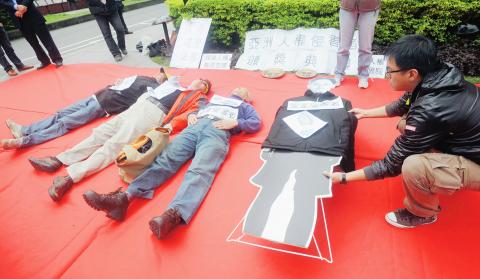A majority of Taiwanese are unhappy with President Ma Ying-jeou’s (馬英九) policies and how his administration has handled human rights development, public opinion polls released yesterday on International Human Rights Day showed.
Almost two in three respondents, or 62.3 percent, were not satisfied with his administration’s protection of human rights, with only 31.1 percent giving Ma positive reviews on the issue, Joseph Wu (吳釗燮), executive director of the DPP’s Policy Research Committee, told a press conference.
The survey was conducted on Thursday and Friday, and collected 1,170 valid samples with a margin of error of 3.06 percent, Wu said.

Photo: Lin Cheng-kung, Taipei Times
Public dissatisfaction with Ma’s performance in five areas on human rights — economic, environmental, judicial and political rights, as well as care for the disadvantaged — all exceeded 60 percent, with economic rights garnering a disapproval rate of 67.5 percent, followed by judicial protection with 67 percent, Wu said.
Another public survey released by Taiwan Indicator Survey Research (TISR) yesterday showed that a majority of respondents disapproved of most of the major policies that Ma had implemented this year.
The poll, touted as a year-end review of Ma’s policies, was conducted between Thursday and Friday, and collected 1,010 valid samples with a margin of error of 3.1 percent.
The TISR listed 10 major policies and asked respondents whether they supported them.
With the exception of Taiwan’s inclusion in the US’ Visa Waiver Program and a policy requiring the registration of real-estate transaction prices based on market value — both of which gained the support of more than half of those polled — the survey found that most of Ma’s policies were highly unpopular.
The increases in fuel and electricity rates were the most unpopular policy, with 87.8 percent of respondents voicing disapproval; followed by commodity price stabilization measures and pension reform, with 77.6 percent and 73.6 percent of respondents respectively saying the president handled the issues poorly.
Public dissatisfaction with the government’s handling of corruption investigations, US beef imports containing the feed additive ractopamine and the securities capital gains tax all came in above 60 percent, the survey found.
Even among respondents who identified themselves as Chinese Nationalist Party (KMT) supporters, the dissatisfaction rate surpassed 50 percent for five of the 10 policies.
The poll also showed Ma’s approval rating at 17.2 percent, while 73.5 percent of respondents disapproved of his performance. Only 24.6 percent found him credible.

The brilliant blue waters, thick foliage and bucolic atmosphere on this seemingly idyllic archipelago deep in the Pacific Ocean belie the key role it now plays in a titanic geopolitical struggle. Palau is again on the front line as China, and the US and its allies prepare their forces in an intensifying contest for control over the Asia-Pacific region. The democratic nation of just 17,000 people hosts US-controlled airstrips and soon-to-be-completed radar installations that the US military describes as “critical” to monitoring vast swathes of water and airspace. It is also a key piece of the second island chain, a string of

A magnitude 5.9 earthquake that struck about 33km off the coast of Hualien City was the "main shock" in a series of quakes in the area, with aftershocks expected over the next three days, the Central Weather Administration (CWA) said yesterday. Prior to the magnitude 5.9 quake shaking most of Taiwan at 6:53pm yesterday, six other earthquakes stronger than a magnitude of 4, starting with a magnitude 5.5 quake at 6:09pm, occurred in the area. CWA Seismological Center Director Wu Chien-fu (吳健富) confirmed that the quakes were all part of the same series and that the magnitude 5.5 temblor was

Taiwan will now have four additional national holidays after the Legislative Yuan passed an amendment today, which also made Labor Day a national holiday for all sectors. The Chinese Nationalist Party (KMT) and Taiwan People’s Party (TPP) used their majority in the Legislative Yuan to pass the amendment to the Act on Implementing Memorial Days and State Holidays (紀念日及節日實施辦法), which the parties jointly proposed, in its third and final reading today. The legislature passed the bill to amend the act, which is currently enforced administratively, raising it to the legal level. The new legislation recognizes Confucius’ birthday on Sept. 28, the

The Central Weather Administration has issued a heat alert for southeastern Taiwan, warning of temperatures as high as 36°C today, while alerting some coastal areas of strong winds later in the day. Kaohsiung’s Neimen District (內門) and Pingtung County’s Neipu Township (內埔) are under an orange heat alert, which warns of temperatures as high as 36°C for three consecutive days, the CWA said, citing southwest winds. The heat would also extend to Tainan’s Nansi (楠西) and Yujing (玉井) districts, as well as Pingtung’s Gaoshu (高樹), Yanpu (鹽埔) and Majia (瑪家) townships, it said, forecasting highs of up to 36°C in those areas